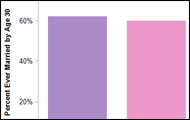
For the first time in more than a century, people with a college degree are more likely to beat their less educated counterparts down the aisle, and white women under 40 are leading the charge, according to a new study by the Pew Research Center.
In 2008, white women with a college education ages 35 to 39 years old (born in the 1970s) were, for the first time, as likely as 35- to 39-year-old white women without a college degree to be married or to have been married at one time. "Specifically, in 2008, 84 percent of college educated white 35- to 39-year-old women had married matching the ever-married rate of white women of the same age lacking a college degree," researchers said in the study, "The Reversal of the College Marriage Gap."
Compare that to 1950, when 66 percent of white female college graduates married by age 40, while 93 percent of those without a college education took the plunge -- a figure cited by the Washington Post. That gap has been steadily shrinking for decades, Richard Fry, lead author of the report, told the Post. "Now it's at zero," Fry said.
For older white women, the education gap still exists, despite a steady decline over the years. In 2008, 94 percent of white women ages 55 to 59 without a college degree were more likely to be have been married, compared to 91 percent who had one, according to the study.
For other races/ethnicities, black women got rid of the marriage gap two decades ago. Black women with a college degree have been marrying in greater numbers than black women without since the 1990s. Racial/ethnic references to black and white include the Hispanic population in this study.
Also a first for marriage trends, in 2008, 62 percent of college-educated 30-year-olds were married or had been at one time, compared to just 60 percent of adults the same age without a degree. For at least the past century that trend had been quite the opposite, with less educated young adults more likely to walk down the aisle.
Use the interactive chart below to track marriage trends for young Americans.
While adults in their 20s, both college educated and not, saw sharp drops in marriage rates over the past two decades, a more extreme decrease was noted for those without higher education, dropping 15 percentage points from 1990 to 2008. Thirty-year-olds with a degree saw just a seven percent drop.
Why the change? The report cites several possible reasons. First the average age at which that those without a degree are marrying seems to be on the rise, moving from 26 in 2006 to 28 in 2008 (the same median age as those with a degree).
It might be attributed to the decline in how much money men without a college degree are earning. From 1990 to 2008 the inflation-adjusted amount men without a college education earned declined by 12 percent, while those with rose by five percent. Men without a degree were also increasingly more likely to live with, instead of marry, their partner.
"There's a double whammy going on for the people who aren't college-educated," Fry told CNN. "They are facing difficult employment, and they are less likely to enter into marriage and receive the economic benefits marriage provides."
The study used 1950 to 2000 decennial Census data, and the 2008 American Community Survey. College-educated refers to people whose highest educational degree or level completed is at least a bachelor's degree. Individuals who have completed some years of college credit or an associate's degree, but not a bachelor's degree, were not included, the study's authors said.
(Pew: The Reversal of the College Marriage Gap, CNN, Washington Post)
Suzette Lohmeyer is a staff writer for State of the USA.
Data visualization by Anthony Calabrese of State of the USA.
 Print This
Print This RSS Feed
RSS Feed